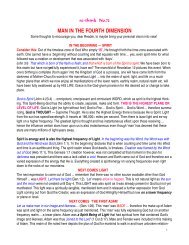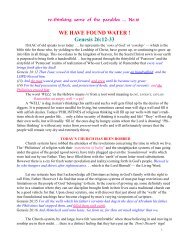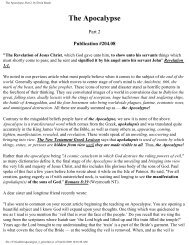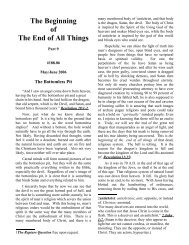- Page 4:
LINCOLN ROOMUNIVERSITY OF ILLINOISL
- Page 9 and 10:
LINCOLN THE UNKNOWN
- Page 11 and 12:
DALE CARNEGIELincolnTHE UNKNOWNDALE
- Page 13:
ToMy Father and Mother
- Page 16 and 17:
Vlll • WHYTHISBOOKBut I didn't wo
- Page 18 and 19:
WHY THIS BOOKsitting-room of the ol
- Page 21 and 22:
1A here was a woman in Harrodsburg
- Page 23 and 24:
— aLINCOLN THE UNKNOWN• 15St. L
- Page 25 and 26:
LINCOLN THE UNKNOWN • 17daughter
- Page 27 and 28:
LINCOLNTHE UNKNOWN• 19broad-minde
- Page 29 and 30:
LINCOLN THE UNKNOWN• 21suspenders
- Page 31 and 32:
LINCOLN THE UNKNOWN•23fered from
- Page 33 and 34:
LINCOLN THE UNKNOWN • 25only ligh
- Page 35 and 36:
and Jefferson as hisLINCOLN THE UNK
- Page 37 and 38:
LINCOLN THE UNKNOWN • 29tions to
- Page 39 and 40:
LINCOLN THE UNKNOWN • 31their anx
- Page 41 and 42:
LINCOLN THE UNKNOWN • 33man witho
- Page 43 and 44:
LINCOLN THE UNKNOWN• 35He reached
- Page 45 and 46:
LINCOLN THE UNKNOWN•37thing of in
- Page 47 and 48:
LINCOLN THE UNKNOWN •39would be o
- Page 49 and 50:
LINCOLN THE UNKNOWN • 41ment she
- Page 51 and 52:
LINCOLN THE UNKNOWN• 43He astonis
- Page 53 and 54:
LINCOLN THE UNKNOWN • 45the storm
- Page 55 and 56:
LINCOLN THE UNKNOWN• 47ledge. McG
- Page 57 and 58:
LINCOLN THE UNKNOWN • 49But that
- Page 59 and 60:
LINCOLN THE UNKNOWN•51was good en
- Page 61 and 62: LINCOLN THE UNKNOWN • 53The court
- Page 63 and 64: Mary Todd and Abraham Lincoln hadn'
- Page 65 and 66: LINCOLN THE UNKNOWN • 57stand a l
- Page 67 and 68: LINCOLN THE UNKNOWN•59will not ma
- Page 69 and 70: LINCOLN THE UNKNOWN • 61Minutes p
- Page 71 and 72: LINCOLN THE UNKNOWN• 63As the lat
- Page 73 and 74: LINCOLN THE UNKNOWN•65Herndon oug
- Page 75: PART TWO
- Page 78 and 79: 70•LINCOLN THE UNKNOWNSmall as Sp
- Page 80 and 81: 72 •LINCOLN THE UNKNOWNphotograph
- Page 82 and 83: 74 • LINCOLN THE UNKNOWNLincoln w
- Page 84 and 85: 76•LINCOLN THE UNKNOWNMrs. Lincol
- Page 86 and 87: 78 •LINCOLN THE UNKNOWNwhether it
- Page 88 and 89: 80• LINCOLN THE UNKNOWNDavid Davi
- Page 90 and 91: 82•LINCOLN THE UNKNOWNOne of Linc
- Page 92 and 93: 84 •LINCOLN THE UNKNOWNunder Gran
- Page 94 and 95: 86•LINCOLN THE UNKNOWNclient had
- Page 96 and 97: 88•LINCOLN THE UNKNOWNShe wanted
- Page 98 and 99: 90 •LINCOLN THE UNKNOWNHerndon re
- Page 100 and 101: 13In 1854, a tremendous thing happe
- Page 102 and 103: I94 • LINCOLN THE UNKNOWNcool san
- Page 104 and 105: 96 • LINCOLN THE UNKNOWNform. As
- Page 106 and 107: 98• LINCOLN THE UNKNOWNfrequently
- Page 108 and 109: 100• LINCOLN THE UNKNOWNKansas kn
- Page 110 and 111: 102 • LINCOLN THE UNKNOWNChicago
- Page 114 and 115: 106•LINCOLN THE UNKNOWNAnd time a
- Page 116 and 117: 15W.hen the newly formed Republican
- Page 118 and 119: 110•LINCOLN THE UNKNOWNit had arr
- Page 120 and 121: 112 •LINCOLN THE UNKNOWNthe opera
- Page 122 and 123: 114 • LINCOLN THE UNKNOWNin twent
- Page 124 and 125: 116 • LINCOLN THE UNKNOWNa centur
- Page 126 and 127: 118 • LINCOLN THE UNKNOWNthan the
- Page 128 and 129: 120 •LINCOLN THE UNKNOWNIf T live
- Page 130 and 131: 17W hile Lincoln was en route to Wa
- Page 132 and 133: 124•LINCOLN THE UNKNOWNThousands
- Page 134 and 135: 126 LINCOLN THE UNKNOWNThe Confeder
- Page 137 and 138: 18Lincoln issued a call for seventy
- Page 139 and 140: LINCOLN THE UNKNOWN • 131That sou
- Page 141 and 142: LINCOLN THE UNKNOWN• 133what they
- Page 143 and 144: 19D uring the first few weeks of th
- Page 145 and 146: LINCOLN THE UNKNOWN• 137leap, and
- Page 147 and 148: LINCOLN THE UNKNOWN • 139"as one
- Page 149 and 150: LINCOLN THE UNKNOWN • 141nation w
- Page 151 and 152: LINCOLN THE UNKNOWN • 143walked i
- Page 153 and 154: LINCOLN THE UNKNOWN • 145when the
- Page 155 and 156: 21When Lincoln turned to his Cabine
- Page 157 and 158: LINCOLN THE UNKNOWN• 149grocery s
- Page 159 and 160: LINCOLN THE UNKNOWN• 151Bible and
- Page 161 and 162: LINCOLN THE UNKNOWN • 153then per
- Page 163 and 164:
LINCOLN THE UNKNOWN • 155Cursing
- Page 165 and 166:
—and rose early.LINCOLN THE UNKNO
- Page 167 and 168:
Lincoln's answer to Greeley isLINCO
- Page 169 and 170:
LINCOLN THE UNKNOWN • 161At the o
- Page 171 and 172:
LINCOLN THE UNKNOWN• 163ing but h
- Page 173 and 174:
LINCOLN THE UNKNOWN •165This was
- Page 175 and 176:
LINCOLN THE UNKNOWN• 167Lee's art
- Page 177 and 178:
LINCOLN THE UNKNOWN • 169Pickett'
- Page 179 and 180:
—LINCOLN THE UNKNOWN• 171Ask hi
- Page 181 and 182:
LINCOLN THE UNKNOWN•173dreds, loc
- Page 183 and 184:
——On a great battle-fieldLINCOL
- Page 185 and 186:
LINCOLN THE UNKNOWN • 177But no m
- Page 187 and 188:
ure at that,LINCOLN THE UNKNOWN •
- Page 189 and 190:
LINCOLN THE UNKNOWN•181and had le
- Page 191 and 192:
LINCOLN THE UNKNOWN• 183millions
- Page 193 and 194:
25I n May 1864, the triumphant Gran
- Page 195 and 196:
LINCOLN THE UNKNOWN•187Some of hi
- Page 197 and 198:
LINCOLN THE UNKNOWN• 189"This war
- Page 199 and 200:
LINCOLN THE UNKNOWN• 191hesitatio
- Page 201 and 202:
26In the latter part of March, 1865
- Page 203 and 204:
LINCOLN THE UNKNOWN• 195in the re
- Page 205 and 206:
27W.e must retrace our steps now, f
- Page 207 and 208:
LINCOLN THE UNKNOWN • 199by Gener
- Page 209 and 210:
LINCOLN THE UNKNOWN • 201fortunat
- Page 211 and 212:
LINCOLN THE UNKNOWN• 203Lincoln w
- Page 213 and 214:
28In 1863 a group of Virginia slave
- Page 215 and 216:
LINCOLN THE UNKNOWN• 207He broode
- Page 217 and 218:
LINCOLN THE UNKNOWN• 209behind th
- Page 219 and 220:
LINCOLN THE UNKNOWN•211Then a wom
- Page 221 and 222:
LINCOLN THE UNKNOWN• 213his best
- Page 223:
PART FOUR*
- Page 226 and 227:
218 •LINCOLN THE UNKNOWNknown—c
- Page 228 and 229:
220 •LINCOLN THE UNKNOWNshred of
- Page 230 and 231:
222 • LINCOLN THE UNKNOWN"Who are
- Page 232 and 233:
224 •LINCOLN THE UNKNOWNin a bask
- Page 234 and 235:
226 • LINCOLN THE UNKNOWNthe mour
- Page 236 and 237:
228 •LINCOLN THE UNKNOWNThe Garre
- Page 238 and 239:
230 • LINCOLN THE UNKNOWNorders.
- Page 240 and 241:
31Booth had hardly ceased breathing
- Page 242 and 243:
234 •LINCOLN THE UNKNOWNbox, over
- Page 244 and 245:
236 •LINCOLN THE UNKNOWNthe cry.
- Page 246 and 247:
238•LINCOLN THE UNKNOWNfessed" th
- Page 248 and 249:
240 • LINCOLN THE UNKNOWNUnable t
- Page 250 and 251:
242 • LINCOLN THE UNKNOWNTrue, a
- Page 252 and 253:
244 •LINCOLN THE UNKNOWNgot into
- Page 254 and 255:
246 • LINCOLN THE UNKNOWNEstrange
- Page 256 and 257:
248 • LINCOLN THE UNKNOWNand, eag
- Page 258 and 259:
250 •LINCOLN THE UNKNOWNDangerous
- Page 260 and 261:
252 • LINCOLN THE UNKNOWNnow empl
- Page 263 and 264:
BIBLIOGRAPHYBadeau, Adam. Grant in
- Page 269 and 270:
—THE DALE CARNEGIE COURSEMore tha
















